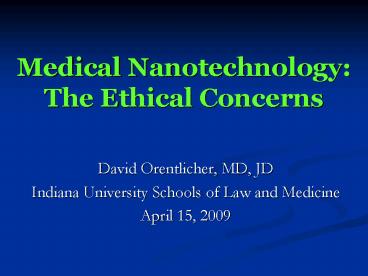Medical Nanotechnology: The Ethical Concerns - PowerPoint PPT Presentation
1 / 15
Title:
Medical Nanotechnology: The Ethical Concerns
Description:
Nanomedicine creation of drugs and devices by operating on a nanometer scale (1 ... law passed in 1907 in Indiana, Buck v. Bell (1927), Nazi experience (1930s-40s) ... – PowerPoint PPT presentation
Number of Views:80
Avg rating:3.0/5.0
Title: Medical Nanotechnology: The Ethical Concerns
1
Medical Nanotechnology The Ethical Concerns
- David Orentlicher, MD, JD
- Indiana University Schools of Law and Medicine
- April 15, 2009
2
Scientific background
- Nanomedicinecreation of drugs and devices by
operating on a nanometer scale (1-100 nanometers)
and exploiting the novel biological, chemical and
physical properties present at that scale - 1 nanometer one-billionth of a meter 50-80,000
nanometers width of a single hair - Greater ability to penetrate cell walls or cross
the blood-brain barrier - Nanoparticles are not just very small particles
- Lighter, stronger, more resilient materials
(e.g., new bone) drugs that are more effective
and better targeted
3
Nanoparticles are not new
- Natural
- Gas to particle conversions (e.g., ammonia
emissions from livestock manure) - Forest fires
- Volcanoes
- Viruses
- Human-generated
- Internal combustion and jet engines
- Power plants
- Incinerators
- Metal fumes (smelting, welding)
- Polymer fumes
- Frying, broiling, grilling
- 113 Env. Health Persp. 823 (2005)
4
Medical uses
- Nanochips and probes for collection of more
comprehensive, more nuanced data (e.g., blood
chemistry, genetic makeup, cancer cell detection) - More focused delivery of drugsenhanced
effectiveness at lower doses (nano.cancer.gov) - Greater ability to remove infectious agents and
toxins and repair or replace damaged cells (?
forestall aging) - Nanodevices to improve the precision of surgery
- ? Enhancement of normal human attributes (e.g.,
radar-like vision, supra-normal hearing)
5
Ethical concerns the overselling of technology
- New technologies often are over-hyped
- Diversion of funding from better uses
- Failure to account for potential risks
- Durability may result in persistence in the
environment and very small size makes it more
difficult to detect presence of nanomaterials. - Smaller size may mean increase in respiratory
disease, longer retention in body, ability to
pass through intact skin - Greater surface area may heighten inflammatory
response - Failure to sustain public support (as happened
with genetically-modified foods)
6
Ethical concernsthe risks to privacy
- Nanochips may provide comprehensive and nuanced
medical data that can be transmitted to a
physicians computer - What are the risks of hacking?
- ? Neuro-implants to improve cognitive ability and
allow brain-to-brain communication - Will our thoughts be monitored by others?
7
Ethical concerns theover-identification of
illness
- Nanodiagnostics and detection of subtle changes
in DNA or blood chemistry. How many cancer cells
make for a cancer diagnosis? - Will nanodiagnosis provoke unwarranted anxiety in
patients and over-treatment of risk factors?
8
Ethical concerns enhancement vs. treatment
- Some writers predict remarkable possibilities for
nanomedicine - Enhanced memory (total recall)
- Infra-red night vision
- Long-range vision
- Wide-spectrum hearing
- But a number of scholars draw a distinction
between permissible treatment of disease and
impermissible enhancement of the human condition
9
Ambivalence abouthuman improvement
- On one hand, we commend self-improvement
- Consider also the praise for people who practice
to become accomplished musicians or study to
become innovative scholars.
10
Ambivalence abouthuman improvement
- But just as we often applaud effort at
self-improvement, we sometimes criticize it
11
Ambivalence abouthuman improvement
- Tension between desire for improving the human
condition and fear of making it worse - Dr. Jekyll and Mr. Hyde
- Frankenstein
- Tension between desire to make the natural state
better and fear of tampering with nature - Genetic engineering
- Artificial methods of reproduction
- Should we distinguish between the relief of
disability and enhancement of the healthy state?
12
Ambivalence abouthuman improvement
- Discomfort with changeIs it appropriate for
children to be born with the same genes as one
parent rather than through a combination of two
parents genes (i.e., cloning)? - History of abuseThe eugenics movement in the
early part of the 20th Century (first
sterilization law passed in 1907 in Indiana, Buck
v. Bell (1927), Nazi experience (1930s-40s)). Is
freely-chosen eugenics different?
13
Ambivalence abouthuman improvement
- Concern for personal identityWhat will it mean
for personal identity if we become dependent on
technological interventions to see, hear, think
and move? People might find it increasingly
difficult to say which of their thoughts and
actions still constitute a personal achievement.
As people become more and more wired
neurologically, will ones uniqueness dissipate?
Is that so bad?
14
Ambivalence abouthuman improvement
- Undermining of effortIf we can turn to
nanotechnology, will we suffer a diminished drive
to succeed. No pain, no gain? Or is this about
not exposing the myth of success based on effort? - Widening of socio-economic disparitiesWill the
well-to-do have greater access to the benefits of
nanomedicine, just as they do to the benefits of
treatment for disability?
15
Over-hyping?
- Over the next fifteen years we will see an
acceleration of innovation, change, and
disruptions on a scale no civilization has ever
seen before. . . . Nanoscience is disruptively
astounding for the potential it may hold to alter
much of what we know. - James Canton, 1013 Ann. N.Y. Acad. Sci. 186
(2004)































